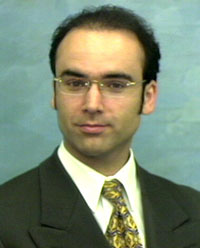 |
Ali Khoynezhad, M.D., Ph.D. |
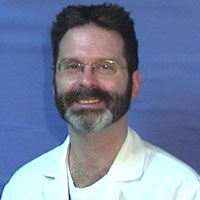 |
Anthony Adelson, M.D. |
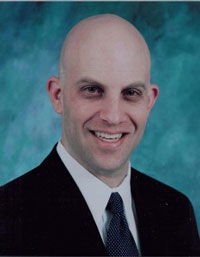 |
William Thorell, M.D. |
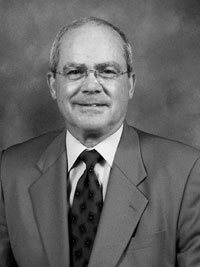 |
Thomas Howard, M.D. |
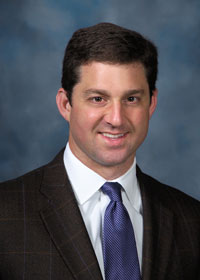 |
Matthew Longo, M.D. |
The center is the only one in the region that brings together experienced specialists from cardiology, interventional radiology, vascular surgery and cardiothoracic surgery to share their skills in vascular care.
“Patients with vascular diseases usually have multiple problems in different areas of their body related to the vascular system,” said Ali Khoynezhad, M.D., Ph.D., cardiothoracic and endovascular surgeon at The Nebraska Medical Center and assistant professor of cardiovascular and thoracic surgery at UNMC. “The Vascular Center allows all the multi-disciplinary specialists to evaluate the patient and collaborate to provide an optimal plan of care and ultimately, better outcomes.”
For instance, in patients with significant coronary artery disease, one-third to one-half will have significant disease in the carotid vessels that carry blood to the head, Dr. Khoynezhad said. In patients who have suffered an aneurysm, one-half will have coronary artery disease. Additionally, one-third of these patients will have additional aneurysms in other areas of the body that will require follow-up and treatment by an endovascular specialist.
Patients who come to the clinic will be evaluated and a plan will be formulated based on that individual’s specific needs.
“The patient is going to benefit because we will communicate in a more collaborative fashion,” said Anthony Adelson, M.D., an interventional radiologist at The Nebraska Medical Center and an associate professor and section head of interventional radiology at UNMC. “This will also provide us a mechanism for review of results and outcomes and help us standardize our treatments based on outcomes.”
“Our patients will receive more comprehensive and efficient care and our specialists will be more accessible,” said Thomas Howard, M.D., vascular surgeon at The Nebraska Medical Center and clinical associate professor of surgery at UNMC. “The vascular center also provides us with a solid mechanism to improve follow-up and long-term care.”
The vascular center includes an outpatient clinic and houses an array of advanced medical equipment and state-of-the-art angio suites that can quickly be transformed into operating rooms. Diagnostic capabilities include a full range of noninvasive vascular laboratory studies for evaluation of carotid and extremity circulatory abnormalities such as CT angiography, MR angiography, standard contrast angiography, intravascular ultrasonography, echocardiography and cardiac catheterization.
The physician specialists involved in the center also bring their own unique set of skills.
William Thorell, M.D., the only endovascular neurosurgeon in the state of Nebraska, offers expertise in a number of minimally invasive interventional procedures that can benefit patients with a variety of neurological conditions.
One of these is endovascular coiling of cerebral aneurysms, a less invasive therapy compared to traditional surgical clipping, the latter of which involves opening the skull to locate and clip off the aneurysm.
Dr. Khoynezhad is the only cardiothoracic surgeon in Nebraska and surrounding states who has undergone dedicated training in endovascular surgery. He is certified to perform a new, less invasive approach to repair complex and potentially life threatening problems in the body’s main artery, the aorta. Using a catheter, a stent-graft is threaded through the femoral artery of a patient’s leg to the site of the damage. Once in place, the graft is inflated, reinforcing the diseased section of the aorta to prevent rupture. This method is effective in 97 percent of cases.
The vascular surgeons at The Nebraska Medical Center are also trained in the latest minimally invasive and open surgical techniques to provide patients with peripheral vascular disease (PVD) the fullest range of options that can be tailored to best suit their needs.
“We are able to treat lower extremity arterial disease with a variety of minimally invasive approaches that result in minimal morbidity and provide excellent outcomes,” said Jason Johanning, M.D., peripheral vascular surgeon at The Nebraska Medical Center and assistant professor of surgery at UNMC.
“Classically, many of these procedures would have been done in an open surgery operation,” said Matthew Longo, M.D., vascular surgeon at The Nebraska Medical Center and assistant professor of surgery at UNMC. “Now most of them can be performed on an outpatient basis and can dramatically affect a patient’s activity level as well as quality of life.”
Minimally invasive peripheral arterial procedures performed at The Nebraska Medical Center include angioplasty, angioplasty and stenting, percutaneous atherectomy, Silverhawk cryoplasty and the excimer laser. The procedure selected depends on the anatomy of the patient and the location and extent of the blockage.
“I am very pleased to be part of the first and largest vascular center in Omaha, which will provide the most advanced vascular care and treatment in the city,” Dr. Khoynezhad said. “The future of health care is in a patient-focused, multi-disciplinary approach and The Nebraska Medical Center is in forefront of this novel concept.”